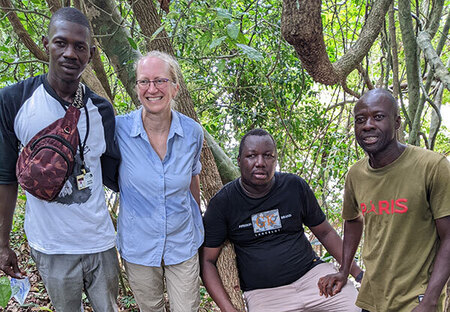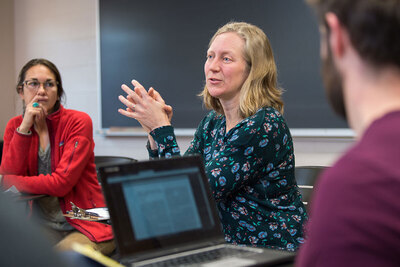Anthropologist wins NEH fellowship to explore toll of climate change in Sierra Leone
University of Notre Dame anthropologist Catherine “Cat” Bolten has been awarded a National Endowment for the Humanities (NEH) fellowship to support the writing of her book that examines links between food insecurity, human population growth and wildlife depletion, land politics and degradation, and climate change in Sierra Leone.
The associate professor of anthropology and peace studies is one of 70 scholars — from among more than 1,030 applicants nationwide — to be awarded the competitive fellowships, which were announced Tuesday.
When she learned she had won the award, Bolten’s first reaction was disbelief, then giddiness.
“Finally, it settled into, ‘They believe in the project as much as I do,’” she said. “And that was a great feeling.”
Her award continues the University’s record success with the NEH, the federal agency that seeks to strengthen the republic by promoting excellence in the humanities and conveying lessons of history to Americans. Since 2000, Arts and Letters faculty have earned more NEH fellowships than any other private university in the country.
“I am delighted to see one of our anthropology faculty receive this support from the NEH, especially for work in the environmental humanities, an area of research that is vital to our understanding of the present and hope for the future,” said Sarah Mustillo, the I.A. O’Shaughnessy Dean of the College of Arts and Letters. “I am thrilled and proud that Cat has continued our strong track record in earning NEH fellowships and grants across a wide range of disciplines.”
Bolten developed her NEH proposal with Josh Tychonievich, the research development program director in the college’s Institute for Scholarship in the Liberal Arts. She also participated in an NEH writing group hosted by the institute, which provided faculty opportunities to work together on proposals and receive support and feedback from colleagues and staff.
A new way forward
Bolten was inspired to write the book while contemplating feedback from journal editors who rejected her article submissions generated through research from her work on the Tonkolili Chimpanzee Project in the West African nation of Sierra Leone. Each reviewer provided contradictory guidance and indicated they were unsure of which direction her multifaceted research should take.
A book, she decided, was the best way to make that all clear.
“After the third or fourth rejection, I was sitting on my couch, slightly paralyzed, not knowing what to do with this project,” said Bolten, who also is the director of doctoral studies at the Kroc Institute for International Peace Studies and a concurrent associate professor of Africana studies. “Suddenly, everything came together in my mind. I grabbed the nearest notepad, and in 12 minutes, I wrote the basic outline for the book.”
Within three days, she had an eight-page outline. And two months later, she had a book proposal. The book, Bolten’s third, is tentatively titled “Unknowing the World: Humans, Chimpanzees, and Climate Change in Sierra Leone.”
“Unknowing” refers to the paralysis and loss of sense of self that people feel when the wisdom of the ages fails them and they no longer have the capacity to create and invent to tackle pressing challenges.
“Essentially, we’ve reached a point where the speed of change is accelerating past the ability of generational knowledge to innovate,” she said.
Cascading effects
Bolten has been studying Sierra Leone for two decades, publishing more than a dozen articles and two books, “I Did It to Save My Life: Love and Survival in Sierra Leone” and “Serious Youth in Sierra Leone: An Ethnography of Generation and Globalization.”

Her research for the new book began with the Tonkolili Chimpanzee Project, which, in the midst of unprecedented deforestation, strives to conserve wild chimpanzees who raid farmers’ crops in order to survive. The project aims to stop farmers from hunting chimpanzees by reimbursing them for lost crops, and minimizing conflicts between people and chimpanzees.
“If you really dig down deep with people in Sierra Leone, they know that they need chimpanzees in their forest in order for the forest to be healthy,” said Bolten, who is also a faculty fellow of the Eck Institute for Global Health, Pulte Institute for Global Development and Reilly Center for Science, Technology and Values. “They know this, but they can’t think about this every day when their kids are crying from hunger.”
Creating a sustainable future, Bolten said, is more than just trying to reverse the statistics on rising carbon dioxide levels and the number of species going extinct — and it’s about more than conserving one environment or one species. It involves asking real questions about what a livable world looks like.
“There’s often an instance of what I call the ‘politics of post-colonial blame,’ which is that it’s very easy to ignore long histories of colonialism when you’re looking at people struggling in their environments right now,” she said. “It’s easier to say, ‘Slash-and-burn agriculture is bad and that’s why your land is dying,’ rather than asking what much longer politics were involved in this.”
Bolten has been studying past politics in Sierra Leone’s long history — including its civil war, the exploitative commercial farming practices of British American Tobacco, the colonial railway built in the 1890s and myriad cascading effects — to learn about the impacts those forces and events have had on the present.
A livable future
These and other intertwined histories need to be understood if a livable future is possible, Bolten said.
It doesn’t mean trying to restore a fully natural, indigenous, conserved environment either, she said, noting that wild chimpanzees now frequently nest in a plantation tree from Indonesia that was introduced by the colonial government. And one of their primary food sources is the mango, which was introduced by the Portuguese. Another is a genetically engineered oil palm introduced through United Nations extension offices 90 years ago.
“We can’t ignore the fact that these trees have histories of slavery, colonialism and neo-colonialism attached to them,” she said, “but that doesn’t mean the chimps won’t nest in them or eat them.”

There is much to be learned from the chimpanzees, Bolten said, who have adapted faster and better to the degraded landscape than people. They’ve altered both their feeding and nesting practices to survive.
That’s not the case with humans.
“The villages look the same, the people act the same, they farm the same,” Bolten said. “They’re not able to ask themselves if a village should be here in this highly eroded area. Villages used to move all the time. It was a cycle of movement and adaptation. But now, humans feel stuck because the population has grown quickly. They have doubled down on maintaining villages they currently have, even as they are aware that they are draining the resources, and the land is never able to bounce back.”
For Bolten, the answers to these complicated challenges can only come through a multifaceted approach that both embraces and goes beyond science and social science.
“I always tell my students that the most important thing about research is learning to ask the right question,” she said. “That’s what I see happening so infrequently right now. I want people to ask better questions and find creative, non-disciplinarily isolated ways to answer them.”
Originally published by at al.nd.edu on Jan. 13.
Latest Colleges & Schools
- Using forest resources strengthens food security, study findsForests can reduce hunger in rural households while also capturing carbon and advancing sustainability goals for low- and middle-income countries, according to new research by Daniel C. Miller, associate professor of environmental policy at Notre Dame’s Keough School of Global Affairs.
- Notre Dame Law School clinic to be named the Lindsay and Matt Moroun Religious Liberty ClinicNotre Dame Law School announced July 10 that its Religious Liberty Clinic will now be named the Lindsay and Matt Moroun Religious Liberty Clinic. The clinic was established in 2020 upon a foundational gift from the Morouns.
- In memoriam: Benjamin Radcliff, professor of political scienceBenjamin Radcliff, a professor in the Department of Political Science at the University of Notre Dame, died June 10 after a long illness. He was 60.
- COVID-19 pandemic tied to low birth weight for infants in India, study showsThe incidence of low birth weight rose sharply in India amid the COVID-19 pandemic, according to new research from Santosh Kumar, associate professor of development and global health economics at Notre Dame’s Keough School of Global Affairs.
- Peace Accords Matrix expands to the PhilippinesBuilding on its international success and reputation in peace accords monitoring, the Kroc Institute for International Peace Studies, part of the Keough School of Global Affairs, and its Peace Accords Matrix (PAM) program have launched their next global project: PAM Mindanao (PAM-M) in the Philippines.
- US states shape foreign policy amid national China unease, research showsState-level officials such as governors, state legislators and attorneys general are shaping U.S.-China relations as the two countries navigate a strained geopolitical relationship, according to new research by Notre Dame political scientist Kyle Jaros.













